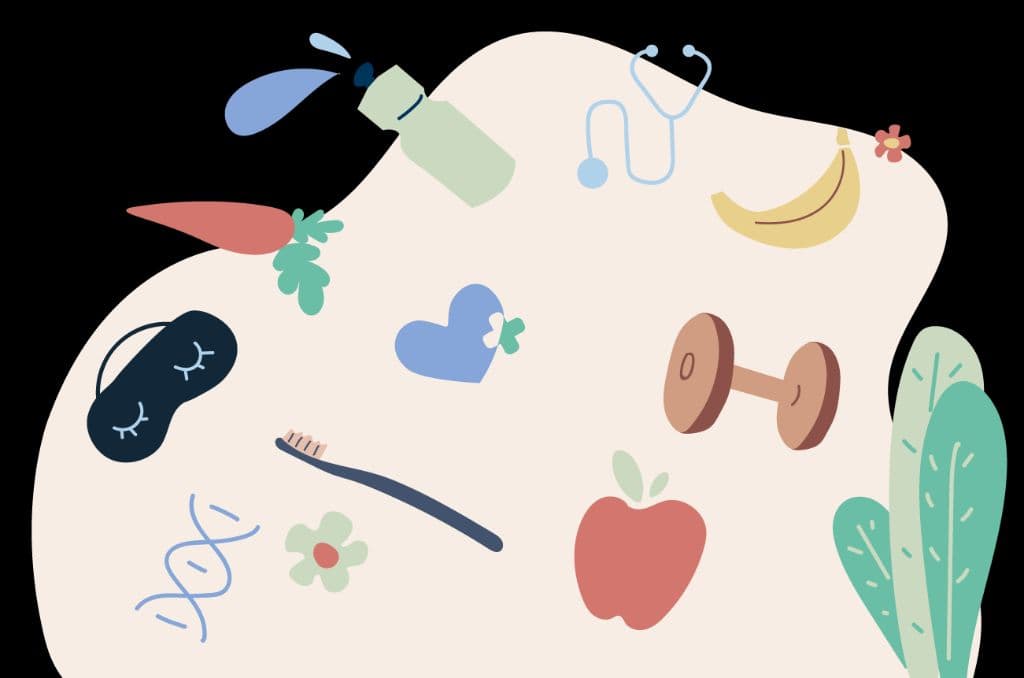This article is compiled by Sanjana Varma, a freelance writer of Proactive For Her.
Decoding Caffeine
Caffeine is a natural stimulant most commonly found in tea, coffee, and cacao plants. It’s added to some foods, drinks and some pain relievers. Caffeine works by exciting your nervous system which may make you feel more awake and alert. Caffeine stimulates the brain and central nervous system, helping you stay alert and prevent the onset of tiredness. It may increase blood adrenaline levels and increase brain activity of the neurotransmitters dopamine and norepinephrine which play a crucial role in determining your mood and behaviour. This combination further stimulates the brain and promotes a state of arousal, alertness, and focus. Caffeine is often referred to as a psychoactive drug due to its effect on the brain. Additionally, caffeine tends to exert its effects quickly.
What are some sources of caffeine?
Caffeine is naturally found in seeds, nuts, beans and leaves of certain plants. It is found in coffee, tea, caffeinated soda, energy drinks and in some prescription medicines. Caffeine is a part of dark chocolate, diet pills, pre-workout supplements and dietary supplements.
Let’s take a look at the amount of caffeine expected per 8-ounce (240-mL) serving of some popular beverages:
- Espresso: 240–720 mg
- Coffee: 102–200 mg
- Yerba mate: 65–130 mg
- Energy drinks: 50–160 mg
- Brewed tea: 40–120 mg
- Soft drinks: 20–40 mg
- Decaffeinated coffee: 3–12 mg
- Cocoa beverage: 2–7 mg
- Chocolate milk: 2–7 mg
- RedBull: 6-67 mg
- Milk chocolate: 1-15 mg
- Dark chocolate: 5-35 mg
Caffeine is included in some prescriptive and over-the-counter drugs like cold, allergy, and pain medications. It’s a common ingredient in weight loss supplements.
What is hidden caffeine ?
Energy drinks often contain additives that may be hidden sources of caffeine often making you miscalculate the caffeine you’ve consumed and making you feel jittery. These additives are meant to enhance the effect of your drink. If you are trying to cut down on your caffeine, be very mindful when reading food and drink labels.
The Effects of Caffeine on Women
The way a woman’s body responds and reacts to caffeine consumption may differ from a man's, especially in the way caffeine interacts with hormones, the menstrual cycle, and other body functions. Caffeine may also affect the endocrine(hormones), renal( kidney) and nervous systems. They experience common side effects associated with caffeine, such as nervousness, wakefulness, dizziness, nausea and irritability.
Caffeine affects a woman’s body in different ways. Although caffeine is not known to cause aggravated symptoms or problems, it is found to create difficulties in the body.
- Breasts: Although having caffeine does not increase your risk for any breast conditions, laying off of it can definitely help. Women with cyclical breast pain have reported that reducing or/eliminating caffeine helped to relieve breast pain,bloating and breast tenderness premenstrually.
- Caffeine and PMS: Menstruators often feel fatigued toward the end of their menstrual cycle as the rise in the hormone progesterone also promotes sleep. They often resort to caffeine to improve focus and concentration. Conversely, evidence suggests that caffeine can have quite the opposite effect in women who experience severe PMS and PMDD symptoms. It is a better idea if they lay off the caffeine and carbonated drinks during this phase.
Psychiatric Symptoms: Excessive consumption of caffeine causes mild confusion, restlessness and irritability. Caffeine may lead to an increase in anxiety and panic disorders in women. - Sleep disturbances: Women who consume extra doses of caffeine tend to suffer from insomnia or lack of proper sleep. It makes waking up harder as well. Excess caffeine can cause body changes that stress the adrenal glands and also affect their ability to maintain sex hormone levels as women transition into menopause.
- Cognitive Function: Women who consumed 3 or more servings of coffee daily are found to reduce cognitive decline in women. It helps women to improve their brain function like memory, concentration and attention.
- The risk of infertility: Consuming upto 200 mg of caffeine a day (6-8 ounces of coffee * 2 cups ) is considered safe. Anything above that can increase the risk of infertility by throwing your reproductive hormones off balance.
- Problems in pregnancy: The consumption of caffeinated beverages during pregnancy can pose an increased risk of miscarriage, congenital defects and, increased difficulty during childbirth. While 2 cups of coffee a day are normal and safe to take, an excess of caffeine can accumulate in the unborn baby’s tissues and cause long term harm.
- Caffeine and Weight Gain: While caffeine was initially marketed as a weight loss supplement in the yesteryears, research has shown that caffeine increases your stress hormone cortisol prompting your body to essentially generate a stress reaction. This may cause an increased desire for larger meals and craving behaviors, thus causing weight gain if consumed beyond the upper limit.
- About insulin resistance and thus, PCOS: Caffeine makes your body process sugar differently. By raising the stress response, it can prevent your body from processing sugar and from making any more insulin. This can worsen insulin resistance, PCOS and diabetes in the long run. Caffeine also affects sleep indirectly worsening that insulin resistance further.
- What about acne and breakouts ? Caffeine can worsen your acne in multiple ways indirectly. By increasing cortisol, it can worsen oil build up on your facial skin and cause acne. Caffeine also causes dehydration (you pee a lot) and that can prevent toxins from flushing themselves out.
The Lighter Side
A cup of coffee a day can give you more than a jolt of energy. Studies show that caffeine plays a vital role in preventing some major diseases of our times. In the right doses, caffeine is the perfect medication that you can take guilt-free.
Studies found that the second cup of coffee produced no benefits unless it was consumed at least 8 hours after the first cup. It’s important to note that coffee and tea contain other bioactive compounds (besides caffeine) that may also be beneficial.
The Darker Side
The effect caffeine has on a person depends on her sensitivity to its effects. The sensitivity is affected by body weight and the typical intake of caffeine.
Having too much caffeine can cause immediate side effects like:
- Jitters and restlessness
- Anxiety
- Insomnia (trouble sleeping)
- Headaches
- High blood pressure
- Fast heart rate
- Urinate (pee) more often
- Dehydration ( when you are in the heat or working out)
- Lower bone density ( weak bones)
- Lesser absorption of calcium and low bone density
Please Note - If you take caffeine in combination with some medications used for ADHD, asthma, and certain heart conditions, the jitters can be more noticeable and uncomfortable. You must ask your health care provider if you should avoid caffeine. In addition, caffeine mixed with alcohol creates a false sense of awareness, hence, should be avoided.
Recommended Dosage
Medical professionals recommend that kids under the age of 12 should not consume any caffeine and teens limit or avoid caffeine. For adults, a limit of 400 milligrams of caffeine per day (which roughly equals 4 cups of coffee, 2 cans of soda, or 2 energy drinks) is considered safe.
Ways To Cut Back On Caffeine :
- If you are thinking of cutting back on caffeine, you can try and start slowly.
- Try substituting one or more of your caffeinated beverages with water. Water will also prevent any dehydration and leave you feeling energized.
- Stopping quickly may lead to headaches, fatigue or lack of energy, and irritability or crankiness for a few days. This effect is especially prominent between 12-24 hours of dropping a coffee.
- You can consider switching to decaffeinated or caffeine-free options. It might make you feel tired but your energy levels will soon return to normal.
- Green tea as an alternative to coffee. Tea contains 30 mg of caffeine and theanine (amino acid) which gives calming effects. Try not to consume caffeine after 3 pm to avoid sleepless nights.
The bottom line
Caffeine isn’t as unhealthy as it was once believed. Evidence shows that it may be just the opposite. It all depends on how much caffeine you consume. We all need a pick-me-up cup every day, it is normal. Don’t let coffee control you to an extent that you are addicted to caffeine. Now that we got the facts right, it’s time to enjoy a cup of health!
Disclaimer - This information is provided for educational purposes and should not be construed as medical advice. Please consult with your healthcare practitioners before undertaking any changes in your diet or adding supplements.
ProactiveForHer is a digital clinic for women, offering accessible, personalized, and confidential health-care solutions. We offer products and services for out-patient health concerns of Indian women, across their lifetime - from puberty to pregnancy to menopause. To know more on the sexual and reproductive health of women, visit https://www.proactiveforher.com/

